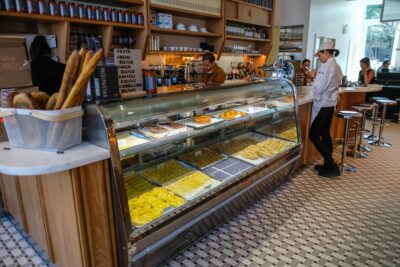Photo: Sophocles Alexiou
‘Pleasure activist’ Fred Plotkin on food, opera and being knighted in Italy
Warning: reading this interview will make you crave pasta, music and all things Italian
Fred Plotkin loves all things Italian and he aims to make you do the same.
The author of nine best-selling books—including “Opera 101: A Complete Guide to Learning and Loving Opera,” “Italy for the Gourmet Traveler,” “The Authentic Pasta Book,” “Recipes from Paradise: Life & Food on the Italian Rivera”—Plotkin is a speaker, a teacher and an opera consultant who has advised on such films as Ron Howard’s 2019 documentary, “Pavarotti” and the Academy Award-winning “Moonstruck.”
Every Friday he hosts in-depth conversations with leading figures in music, media and food from all over the world for the Berlin-based streaming service, “Idagio.” Check them out on YouTube.
But you can catch him closer to home, too. For the past decade-plus, Plotkin has worked with the Brooklyn Academy of Music to present lively pre-screening lectures prior to their broadcasts from the Metropolitan Opera.
One recent afternoon, after attending his BAM talk on “Rigoletto,” Brooklyn Magazine’s Jessica Robinson sat down with Fred to discuss the arc of his career—from his childhood in Brooklyn to being knighted by the President of Italy.
This interview has been edited for flow and clarity.
How did growing up in Brooklyn shape your love and knowledge of food, opera and all things Italian?
I grew up not far from the Brooklyn Academy of Music in a working-class arts-loving family. BAM was welcoming to me as a small child. I had a Saturday routine with my father: We’d go for a show at BAM, then the reward of a jelly donut or a chocolate-tipped almond horn from Ebinger’s. [The beloved bakery, which opened in 1898, closed in 1972.]
BAM welcomed children?
At BAM, children from every background heard classical music, opera, jazz and what used to be called “ethnic” music of all the populations in the area. Early on, I was formed as an egalitarian who believed that all art should be available to all people. That was the way forward.
When did Italy first enter your consciousness?
My interest in Italy came when I learned about the Renaissance and the concept that creativity and ideas from the past could produce art and beauty in the present. I wanted to learn everything I could about the broadest range of things possible rather than specialize in one or two things as most kids seemed to do. I was five years old.
And precocious! Here’s this kid from Brooklyn who grew up to become honored, in 2015, with the title of Cavaliere dell ‘Ordine della Stella d’Italia, the Italian equivalent of a knighthood. When the President of Italy bestowed the honor he called you “one of the most admired and esteemed experts on our country.”
That is something that I’m very proud of.
The New York Times has referred to you as “A New Yorker with the soul of an Italian.” You refer to yourself as “a pleasure activist.” What does that mean?
Probably not what you think it does! Most humans have been given the remarkable gift of five senses, but few use them to their fullest potential. I try to activate all of them all the time and, in so doing, make myself open to sensations and memories most people miss. I listen rather than hear. I savor rather than eat or smell. I look rather than see. I feel rather than touch. This activation gives me pleasure and insights and, I believe, feeds a sixth sense: intuition.
Speaking of feeding, your first book, “The Authentic Pasta Book,” was published in 1985 when you were just 29 years old. What inspired you to write it?
I lived in Italy for much of the 1970s as a student and also worked in opera houses, culminating with La Scala as a Fulbright Scholar. When I came home to New York in 1979 and eventually became performance manager at the Met, I realized that the vast culinary heritage I absorbed in Italy was scarcely known in the States. After performances at the Met, I made dinners for European artists who said that my Italian cooking was like home, rather than heavy (though delicious) Italian-American cooking. I fed Luciano Pavarotti often, and he helped me on my way into publishing “The Authentic Pasta Book.”
Did Pavarotti have a favorite recipe from the book?
He actually gave me a recipe for the book. It was spaghetti alla carbonara. He gave it to me as a favor, as a way of helping make the book more marketable. He understood that his recipe would help boost sales. And it did!
Let’s talk about your involvement with the Academy Award-winning—and utterly delightful—“Moonstruck.” The key love segment in the movie unfolds to the Metropolitan Opera’s performance of “La Bohème.” How were you chosen to be the opera consultant?
This was the first film I was ever hired to work on in a capacity other than being an extra. The scenes at the Met needed someone who knew the opera house. I was then performance manager at the Met, but they paid me a fee to be the “opera expert” because I knew opera and spoke Italian. It was a thrill to watch them making these now-famous scenes, and then being asked by the location manager and assistant director if everything was faithful to opera, its audiences, and the particular ways of the Metropolitan Opera House.
What was it like to work with Cher?
The film is suffused with operatic music. The famous scene where Cher and Nicolas Cage go to the Met to hear “La Bohème,” it is important to note that there was nothing on the stage. The stage was empty. They sat in a box in the auditorium, pretending to “watch” a performance. But in reality, they were viewing an empty stage and listening to a recording. Cher reacted to the recording, as well as what I told her the recording was about. I was explaining what was happening. She really had tears welling up when she realized Mimi was going to die. Opera allows emotions to flow when we connect to the music and story, and Cher, in “Moonstruck,” was the perfect example of how this happens.
Speaking of opera, let’s go back to BAM. I know you’ve been presenting the pre-broadcast talks for over a decade. And that you have a devoted following. Could you tell me a bit about how that happened?
Soon after BAM began showing Met HD transmissions, I was invited to speak before many of the screenings. I felt a strong connection with the smart, diverse Brooklyn audience that responded to my passionate presentations. I love appearing at BAM.
Next on your BAM agenda will be Donizetti’s formidable, and storied, “Lucia de Lammermoor,” which will be broadcast on May 21. The opera is loosely based on Sir Walter Scott’s historical novel “The Bride of Lammermoor.” This opera was written in 1835. Would you say Lucia still has meaning and value in today’s world? Would you say it’s contemporary?
Yes. Because it’s about repression of women. It’s about a woman who was treated like shit by her brother who deceives her. It’s about mental illness. It’s about women who are used as commodities, for money and that, sadly, is as meaningful today as it was in 1835.
Lucia’s aria “Il dolce suono” (“The Sweet Sound”) in the famous “mad scene” is considered a showpiece of insanity. It is one of the most technically demanding arias in all of opera. The soprano hits a high F. I mean, Donizetti wrote it that way, but few sopranos who sing that role can hit that high F. It’s a killer.
That’s the other thing. When I teach opera to young people the first thing I say is, “Did you know that they don’t use microphones?” And most of them don’t realize that. They are a generation that grew up hearing everything amplified. And when I say that gorgeous sound and singing that floods over 4,000 seats [at the Met], that comes out of a body without amplification, when they discover that, then suddenly they’re drawn to it in new ways.
I want to end with a quote from you. In your cookbook “Recipes from Paradise,” you wrote, “Lucky is the man who is born in the place where he is meant to be. Almost as lucky is the man who finds the place he is meant to be early enough that he can make it part of his life in significant ways.” Clearly you were lucky, early on, to find the place you were meant to be.
I was lucky to be born in New York, which formed me, and then have Italy become part of my life. Italy gave it character and context. I see things as a New Yorker who became an Italian by osmosis.
Here is where to catch the May 21 broadcast of “Lucia di Lammermoor.” Order tickets today and don’t miss Fred’s pre-screening lecture which begins at noon.
You might also like 


























